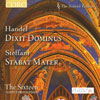Handel Ode for Queen Anne; Dixit Dominus
Desirable Dixits from Creed and Christophers go head to head
View record and artist detailsRecord and Artist Details
Genre:
Vocal
Label: Coro
Magazine Review Date: 11/2009
Media Format: CD or Download
Media Runtime: 0
Mastering:
Stereo
DDD
Catalogue Number: COR16076

Label: Harmonia Mundi
Magazine Review Date: 11/2009
Media Format: CD or Download
Media Runtime: 0
Catalogue Number: HMC90 2041

Author: David Vickers
Dixit Dominus is evidently the main commercial attraction for The Sixteen’s Coro label, although Harry Christophers has chosen to precede it with Agostino Steffani’s Stabat mater. The Sixteen’s sincere and nourishing performance does glorious justice to Steffani’s profoundly moving and lovely setting. The strings, led by Walter Reiter, perfectly convey exquisite melancholy (the tenor duet, “Quis est homo qui non fleret”, or the solemn opening, sung poignantly by Elin Manahan Thomas). The Sixteen’s sensitive interjections are immaculately moulded and blended. The soloists are consistently excellent too, notably Rob Macdonald’s subterranean bass in “Vidit suum dulcem Natum”. Perhaps single voices could have been used throughout, but the choral sections never swamp the intimacy of the music; the suspensions and resolutions in the opening section of “Quando corpus morietur” are beautifully judged.
The Sixteen’s Dixit Dominus is better than average, too. Christophers’s previous recording veered a little too close to blandness at times. The 2009 upgrade of The Sixteen retains only three musicians from two decades ago, and it is a markedly stronger interpretation – dramatically astute, plenty of weight in the dramatic G minor opening, and unbridled (yet never unfocused) choral singing (“Juravit Dominus”). The five members of the choir who step forward for the solos are more convincing than most of their Berlin counterparts (the unforced duet in “De torrente” is ideally spellbinding and ethereal). Christophers’s animated and flawless direction is perhaps amiable in character compared to Creed’s daring performance, which bursts with the impression of Handel unleashing his precocious talent on the Romans (there is an equal place for both approaches, of course). The theatrical effect of “conquassabit” is a startling knock-out blow under Creed, and instead has a measured gravitas under Christophers. The Sixteen’s organist Mark Williams has the spotlight with some embellishments in the opening of “Gloria Patri et Filio”, with a fairly light articulation of the actual basso continuo line, whereas Creed concentrates firmly (and perhaps rightly) on the stark yet vividly rhetorical bass theme. Fussy Handelians won’t be disappointed by either of these two excellent new Dixits, but could be mildly disappointed by the Berliner’s uneven ode, whereas The Sixteen’s advocacy of Steffani’s Stabat mater is essential listening.
Discover the world's largest classical music catalogue with Presto Music.

Gramophone Digital Club
- Digital Edition
- Digital Archive
- Reviews Database
- Full website access
From £8.75 / month
Subscribe
Gramophone Full Club
- Print Edition
- Digital Edition
- Digital Archive
- Reviews Database
- Full website access
From £11.00 / month
Subscribe
If you are a library, university or other organisation that would be interested in an institutional subscription to Gramophone please click here for further information.




